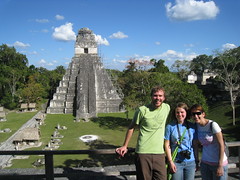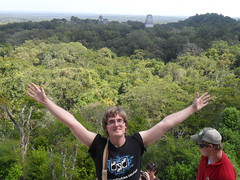 This weekend was a second one in a shoreline Paradise, as our group descended upon the mostly undeveloped rainforest region of Tikal in the northernmost part of Guatemala. This past week we finished our first section of intensive Spanish and we will all be moving up a level and changing around classes in the week to come. Tikal was a welcome respite before we start the new challenge of our second four week intensive Spanish courses. We walked through the rainforest and visited excavated ruins of the once thriving Mayan empire of Tikal. Huge mounds of dirt covered in trees and vegetation are scattered all over this jungle region reminding visitors that only a fraction of these ruins have been excavated in the archeological process that has been going on since the 1950s. Our guide told us that in Tikal there are more than four thousand ancient buildings right in the middle of the rainforest. We met quite a variety of flora and fauna, my personal favorites being the spider and howler monkeys we encountered munching on trees and holding conversations with each other. The proper description of a howler monkey is a mixture between
This weekend was a second one in a shoreline Paradise, as our group descended upon the mostly undeveloped rainforest region of Tikal in the northernmost part of Guatemala. This past week we finished our first section of intensive Spanish and we will all be moving up a level and changing around classes in the week to come. Tikal was a welcome respite before we start the new challenge of our second four week intensive Spanish courses. We walked through the rainforest and visited excavated ruins of the once thriving Mayan empire of Tikal. Huge mounds of dirt covered in trees and vegetation are scattered all over this jungle region reminding visitors that only a fraction of these ruins have been excavated in the archeological process that has been going on since the 1950s. Our guide told us that in Tikal there are more than four thousand ancient buildings right in the middle of the rainforest. We met quite a variety of flora and fauna, my personal favorites being the spider and howler monkeys we encountered munching on trees and holding conversations with each other. The proper description of a howler monkey is a mixture between  a scream and a roar that continues without end for several minutes. We witnessed two of these howling at each other, and my group mates commented ¨that can’t lead to healthy family dynamics.”
a scream and a roar that continues without end for several minutes. We witnessed two of these howling at each other, and my group mates commented ¨that can’t lead to healthy family dynamics.”
As I relaxed on the lake outside of our ecological hotel (complete with hammocks and mosquito nets) I was reminded of the title of one of our cross cultural group’s books ¨Paradise in Ashes¨. This book details how not long ago in the 1970s and 80s poor Guatemalans without land migrated to another lush jungle region in the north of Guatemala to make a better life for themselves. Not long after they settled a small guerilla force brought Guatemala’s 36 year long civil war to ¨Paradise¨. We have been reading and discussing the harrowing accounts of the massacres and genocidal tactics of the Guatemalan government army during the 1980s that occurred in the northern jungle regions.
This war was one of the ¨hot¨ parts of the cold war and the Guatemalan government received full support from Reagan and the US government during the 80s to suppress the communist guerrillas who fought during the civil war. The whole war was wrapped up in the poverty and social problems of this country. An incredibly inequitable land ownership system, virtual slavery of the rural landless population, and an oppressive government that US based United Fruit Company helped install in a coup, drove many to sympathize with the guerilla movement. When I try to put myself in the shoes of the rural poor who joined the guerrilla movement I have serious problems believing that it was because they believed in Marxist ideology. Rather it was the burning of villages, destruction of crops, massive killings of civilians, ripping open of pregnant women, and rape committed by the military during the civil war that drove people to either flee the country or take up arms to defend themselves.
The label ¨communist¨ has been used here to do a great number of horrible things here in Guatemala. Priests and pastors that worked with the poor, village cooperatives, and peaceful change movements were all likely to be denounced as communist and their leaders killed. Peaceful change was impossible in this country and could get you killed, so joining the militarized guerillas did not seem like such a bad deal to many and the poor and oppressed often saw no other way than violent revolution to change their circumstances. My host dad told me that people could still use his involvement in protest movements during this time against him to this day, decades after the peace agreement.
Our group thoroughly enjoyed the jungle of Tikal. It is hard to image that only thirty years ago massive oppression and the most horrible cruelties known to man were going on in these jungle regions of Guatemala. We have been struggling with the questions like, why does God allow such brutality to go on in our world? And what is our responsibility to our neighbor in this world? Our group continues to grapple with the issues of poverty, oppression and migration that are our southern neighbor’s daily realities.
-Joel DeWald